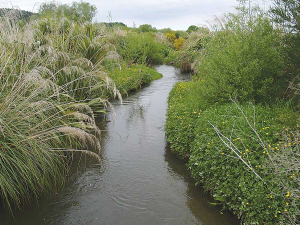Environment Canterbury urges buyers to check wastewater systems on rural properties
Buying or building a rural or semi-rural property? Make sure you know where the wastewater goes, says Environment Canterbury.
 More than 600km of Taranaki river and stream banks will be planted with a million native plants next winter.
More than 600km of Taranaki river and stream banks will be planted with a million native plants next winter.
More than 600km of Taranaki river and stream banks will be planted with a million native plants next winter as the region’s farmers take advantage of a $5 million government boost.
The funding for the Transforming Taranaki riparian management programme will allow eligible farmers to buy native plants for $1 each, create 80 new jobs and bring environmental benefits to the entire region.
The Taranaki Regional Council scheme has been running for 27 years, with farmers voluntarily planting and fencing thousands of kilometres of waterways. In that time Council officers have prepared nearly 3,000 individual riparian plans, and more than 6.2 million plants have been distributed at cost.
The programme’s goal is improved water quality and an increase in biodiversity, with the plants providing habitat for native birds and cover for aquatic species.
About 900,000 plants are being contract-grown for the 2021 winter planting season. The opportunity to buy $1 plants will be offered to Council plan holders in the intensively farmed zone of the Taranaki ring plain and coastal marine terraces, with priority given to those who have demonstrated a strong commitment to riparian planting and fencing over the years.
If eligible, they can order between 500 and 2,000 plants per plan.
The cost includes planting by Council-arranged contractors, whereas previously that had been the responsibility of the landowner. Plan holders will be required to erect fences to protect the plants, estimated to be worth $4.1 million. The value of the combined fencing and planting is expected to be near $10.8 million.
Council land services manager Don Shearman says the funding is great news for the region.
“Taranaki farmers have put in years of hard work planting and fencing their waterways all at their own cost – because they know it’s the right thing to do. And many are now so close to completing their plans.
“This funding will save them thousands of dollars, plus precious time, allowing them to push forward to the finishing line.
“We’re already seeing environmental benefits from the programme, with a NIWA study last year finding many Taranaki sites had the best water quality they’d had since 1995. We’re excited to see the improvements continue.”
The $5 million came from the Public Waterways and Ecosystem Restoration Fund, administered by the Ministry for the Environment. It is part of the Government’s wider Jobs for Nature Programme, part of its COVID-19 recovery package.
Voting has started for the renewal of DairyNZ's milksolids levy.
The most successful catchment groups in NZ are those that have 'a source to sea' approach.
Associate Agriculture Minister and Manawatu dairy farmer Andrew Hoggard says the free trade agreement (FTA) negotiated with India is not a bad deal and his party, Act, will support it when it goes before Parliament.
Newly released data from Environment Canterbury (ECan) Farm Environment Plan (FEP) audits are showing a dramatic lift in environmental performance across the region.
A solid recovery of global dairy prices this year makes a $9.50/kgMS milk price almost a shoo-in for this season.
As New Zealand marks the United Nations’ International Year of the Woman Farmer 2026 (IYWF 2026), industry leaders are challenging the misconception that women only support farming.
OPINION: Fonterra may be on the verge of selling its consumer business in New Zealand, but the co-operative is not…
OPINION: What does the birth rate in China have to do with stock trading? Just ask a2 Milk Company.